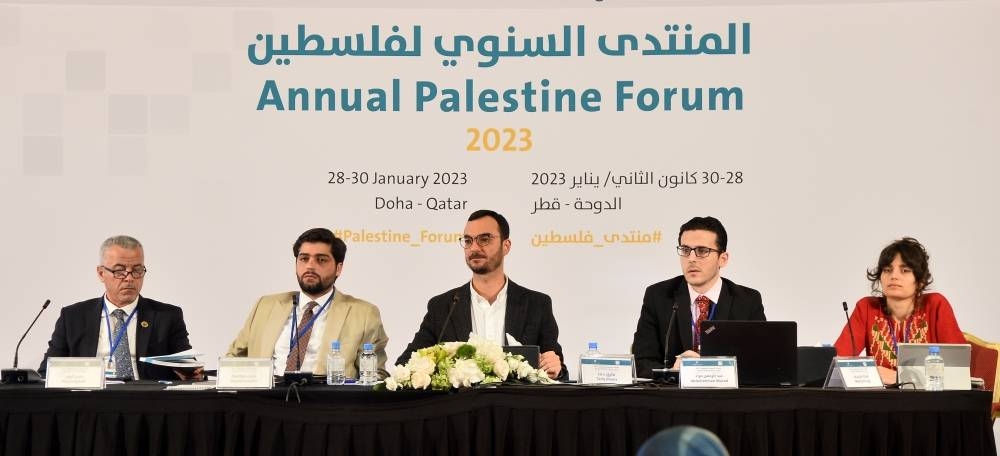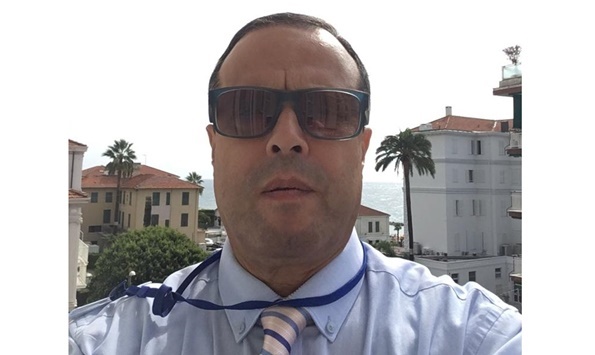Twenty papers were presented and two workshops were held during the second day of the 2023 Annual Palestine Forum Sunday.
The highlights included the launch of the Palestinian Memory Project, as well as the inauguration of the Ostour Symposium.
Eleven papers were presented at the first session, which covered three main themes: the sociology of Palestinian identity, development discourse in Palestine and colonial violence, and Palestine in a historical perspective.
In his paper 'Trans-Territorial Sumud: Refugee Responses to Multiple Systems of Oppression in Bourj el-Barajneh Camp', Rami Rmeileh offered an alternative conceptual framework to understanding the concept of Sumud (steadfast perseverance).
Nour Bader, in a paper titled 'Spatial and Temporal Sociology of Camp Identity: Al-Wehdat – New Amman as a Model', deconstructed the spatio-temporal identity of the Wehdat Camp.
In their paper 'Settler Colonialism and the Birth of New Prisoners: Migration from the Gaza Strip, Ahmed Mamoun and Zahraa Shabana' discussed how Israel attempts to depopulate the Gaza Strip through its blockade.
In her paper 'Between Ruins and Remnants: Religious Renewal among Christians in West Bank Palestine', Elizabeth Marteijn examined Palestinian Christian thought and practice in relation to the changing political and social context of the West Bank.
Four papers looked at colonial violence in development discourse on Palestine.
Hasan Ayoub and Eleyan Sawafta’s paper – 'Development and Settler Colonialism: Perpetuating Neo-Colonial Domination and Apartheid' – discussed the relationship between the conceptual framing of Israel in the Palestinian territories and development practices.
Ashraf Bader’s paper, titled 'A Critical Reading of the Neoliberalism of the Palestinian Authority under Zionist Settler Colonialism', looked at the neo-liberalisation of the Palestinian political economy.
Abdelrahman Murad focused on the proliferation of a counter-discourse on development from Palestinian civil society in response to the neoliberal policies ostensibly put in place for the development of the Occupied Palestinian Territories (OPT) in his paper 'The Construction of a Counter-Hegemonic Discourse on Economic Development: A Critical Analysis of Palestinian Policy'.
Marta Parigi presented her paper on 'The Effect of Israeli Settlement-Related Structural Violence on Palestinian Food Security', which discussed how structural violence entrenched in settlements hinders the Palestinians’ ability to access healthy, nutritious food items.
Three papers discussed Palestine in a historical perspective.
Presenting his paper on 'Transformation of Collective Identity from Ottomanism to Arabism', Adel Manna analysed the life and works of Ahmad Helmi Pasha (1882-1963).
In 'The Palestinian Cultural Scene during the British Mandate: Al-Karmel and Filastin Newspapers as Examples', Johnny Mansour analysed cultural advertisements in newspapers to better understand the Palestinians cultural scene during the British Mandate in the cities of Haifa, Jaffa, and Jerusalem.
Ali T As’ad provided a historical overview of Palestinian exhibition-making through his paper, 'Palestine and the National Sensorium: Exhibition-Making in the Twentieth Century'.
The second session of the Palestine forum focused on three themes: Palestinian economy, demography, and memory.
Three papers were presented on the economy.
Raja Khalidi and Islam Rabee presented their paper *Prospects for Palestinian Economic Co-operation and Complementarity across the Green Line.
They gave an in-depth examination of the economic relations that connect Palestinians in the territories occupied in 1967 with those in Israel.
Rabeh Morrar and Rand Jibril presented their paper 'Promoting the Development of the Startup Ecosystem in Palestine and its Potential Effects on Public Finance', which focused on the effectiveness of the Palestinian Authority’s policies in encouraging the development of a startup culture and economy.
Areen Hawari and Sami Mahajna’s paper – 'Split in Two Parts: The Dynamics of the Commercial Relationship between the Palestinians from within the Green Line and Jenin' – focused on the impact of the daily economic interactions of Palestinians across the Green Line on Palestinian society, its social fabric, and its national unity.
Three papers were presented on demographic research in Palestine.
Youssef Courbage and Hala Naufal’s paper – 'Demography of the Palestinians' – was an overview of the growth of the Palestinian population globally and its political weight.
Mohammed Duraidi presented a paper on 'The Palestinian Population in the Palestinian Territories and the Palestinians within the Green Line: Demographic Status and Population Projections', where he argued that there are unique patterns of population components among residents of the West Bank, Gaza Strip, and Palestinians within the Green Line.
Thayer Hastings’s paper 'On the Crisis of Demographic Balance and Majority in Jerusalem' proposed to identify demography as an institutional location from which to examine the conditions and contradictions of a colonial bio-politics.
Three papers were presented on Palestinian memory of the Nakba and of refugees in different camps.
Azadeh Sobout’s paper on 'War-Memoryscapes and the Grassroots Agency for Justice: Re-Searching the Truth-Memory Practices of Palestinians in Nahr el Bared' provided an exploration of the narratives, stories, and memories that focus on destruction, siege, the postponed home, the need for return, memorialisation, and reconstruction.
Reham Amro’s paper 'The Moment of the Nakba: The Erasure of the Palestinian People, the Keys to Stolen Doors, and the Duality of the Intellectual and the Peasant' analysed the personal testimonies of Palestinian peasants (fallahin).
Rola Sirhan focused on how Arab regimes have manipulated the memory of the 1967 defeat in her paper 'Memory of Defeat and Palestinian Social and Political Imaginaries: Dominance without Hegemony'.
The two workshops Sunday were held in the afternoon.
The first hosted four speakers – Osama Abuirshaid, Ahmed Abuznaid, Malia Bouattia, and Majed Abusalama – who discussed the challenges faced by activists for the Palestinian cause in the Western context.
The second workshop featured the launch of the Palestinian Memory Project website and the relaunching of the Jerusalem Story website by Mueen al-Taher, Kate Rouhana and Khaled Farraj.
The forum will continue Monday, the third and final day, in a similar format to the previous two days, along with the Ostour Symposium being held in parallel to the main forum.
Qatar
Palestinian Memory Project launched at annual forum
20 papers presented Day 2 of 2023 Annual Palestine Forum

A panel discussion in progress at the forum Sunday. PICTURE: Shaji Kayamkulam

